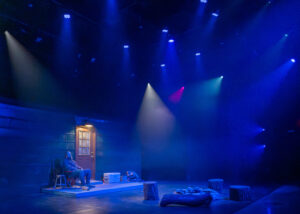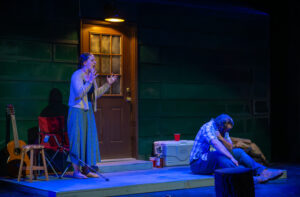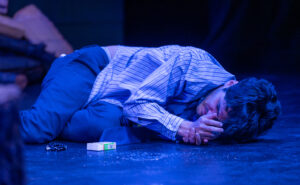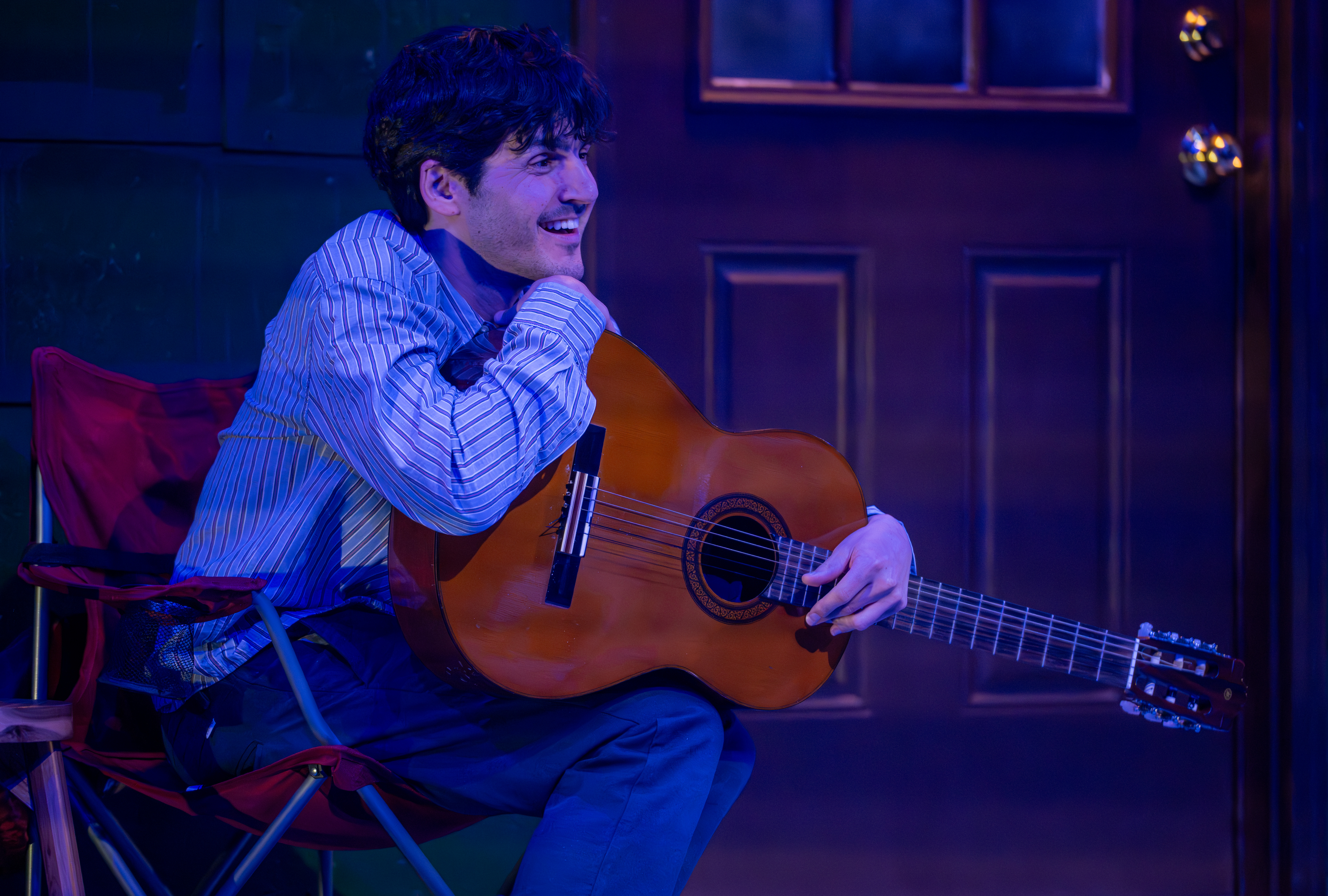IVINS — Written and performed off-Broadway in 2019, Will Arbery’s play, Heroes of the Fourth Turning, was greatly received by theatrical critics and media including being a finalist for the 2020 Pulitzer Prize in Drama. While it was released in 2019, this play seems more current and poignant in 2024. Making its Utah premiere at the Center for the Arts at Kayenta, and under the guidance of Los Angeles-based director Rachel Park (who recently directed True West, also at Kayenta) and the aid of her production and creative teams, Heroes of the Fourth Turning was a provocative, emotional, and intellectual experience.
One thing that puzzled as well as intrigued me was the exclusion of a synopsis of any kind from the show’s playbill. In its place, however, was context. The program listed the play’s geographical setting as simply “Wyoming”, the time in which the play was to take place, and the definition of the word ‘fugue’. I was perplexed at first, as I thought about the musical connotation, until I read the secondary definition. Fugue: A condition or phase involving the loss of recognition of one’s own identity, often paired with sudden flight from one’s home environment. An interesting inclusion, and I wondered how this particular vernacular usage would be utilized.

In first stepping into the black box theater, one always wonders how the space is transformed to meet the demands of the show. Greeted with soft country music, what my eyes pieced together onstage was a cabin in the woods of Wyoming. It was a simple structure with a dim yellow overhanging light illuminating a small porch, which sported a red camping chair, a cooler, a guitar, and a rifle. On the side of the porch was a bundled tarp and a pile of wood. A few feet in front of the cabin was a fire pit, surrounded by large pieces of wood like makeshift chairs. With some haze and dim dark blue light, the cabin and the show waited in the night, ready to wake up and come to life.
As I surveyed the scene, I could hear the music switch to nighttime ambience as a man with a cup of coffee emerged from the cabin, 15 minutes before the show started. He didn’t say anything, he simply sat in the camping chair. He too was surveying the scene before him. As more and more people filled the theater, they dismissed him as perhaps a wax figurine due to his stillness or ignored him altogether. The catalyst of this show was the sound, designed by Joshua France. The design was seamless and methodical. Everything from the snap of a twig which roused our ‘figurine’ from his statue like state at the beginning of the play, to the loud noise of a so-called generator malfunction that periodically punctuated moments throughout the show.
This two and a half hour single act production follows Justin (our mystery man at the start of the show) and three other companions. Two of the companions went to the imaginative Transfiguration College of Wyoming (inspired by the real Wyoming Catholic College) with him, and one is the daughter of the newly appointed president of the college. It’s been seven years since Justin (Jesse Saler), and his friends, Kevin and Teresea graduated college and went on to create their own lives, and with the inauguration of one of their favorite professors, Gina Presson, they are suddenly thrown back into each other’s lives. This sparks a wide myriad of discussions about their lives and their views on the state of our country.

For context, the play derives its name from The Fourth Turning, the favorite book of Steve Bannon, who is the political hero of Teresea (Sadie Kuwano). The Fourth Turning, as Teresea explains, is a Howe-Strauss concept of generational cycles which are broken down into four parts: High, Awakening, Unraveling, and Crisis. But Teresea goes further than simply explaining the cycles, she also includes the archetypes that arise from each cycle: Prophets, Nomads, Heroes, and Artists. Highs normally facilitate Prophets, Awakenings results in Nomads, Unravelings sound the call for Heroes, and Artists arise in times of Crisis. It is humorous to note that Teresea fails to see the importance of Artists and merely brushes that archetype away, but it is the Hero archetype that she fixates on; almost to the point of hyperfixation. She feels it is her job to rally these ‘heroes’ and create change in our nation.
This show is as convoluted and complex as the relationships presented in the show. So, too, are the characters within the relationships themselves. Justin seemingly portrays the strong and silent type and yet has his moments of profundity which he is very methodical on when he uses them, which is a complete foil to his college friend, Kevin (David Rosenblatt). And, I will admit, the physicality differential of the two men aid the contentious and even competitive atmosphere around the two friends. From the moment he stepped onstage, it’s easy to deduce that Kevin loves being the comedic relief, the loud goofball of the group. But still easy to see is all his humor and wildness is to cover up his crisis of faith and identity. And I will add, it was a shock to see him light and smoke a real cigarette onstage, a novelty which Rosenblatt continued through the course of the show. Equally as riveting was the anticipation of Kevin’s humorous outer shell to break; not only when he is by himself, but when he’s surrounded by his friends.

Another interesting foil of characters lie within the female characters, Teresea and Emily (Adalyn Enslen). Teresea is impassioned and commanding in presence, whereas Emily is more demure and tends to be unobtrusive as she is used to being overshadowed by her parents, and more recently her mother. Teresea is physically well and able to take on all that is thrown at her in her sphere of competitive politics but is also crippled by her own insecurities (derived from her past and her future) and the frailty of her self-worth. While Emily is all but literally crippled as she has been plagued by an unnamed disease (could be Lyme disease, could be some form of cancer) for seven years, and yet is seemingly strong as she finds good and grace in everything and everyone. A contrast most tangible by the skill of these two actresses.
While the four friends do a fine job of debating about nearly every political and societal issue that applies to today as it did in 2017, when the play takes place, the emotional and intellectual peak of the show comes with the appearance of Gina (Deborah Threedy). Gina is the newly appointed president of Transfiguration College of Wyoming, a former professor of majority of the group, and Emily’s mother. When she enters from inside Justin’s cabin, despite being tipsy from the celebration of her inauguration, Threedy conducts herself and her character with poise as a fabulous speaker and a leader, which could be explained by her 30+ years profession of a law professor as is explained in her brief biographical piece in the playbill. Her philosophy of “All the most important things have a built-in delay” is contrasted and even contended against Teresea’s want and drive for instantaneous results.
Having shed the power dynamic of student and teacher, the two women engage and parry in the longest and most heated debate of the evening. Teresea is mainly fueled by the desire to be ‘right’ and to prove that she is the most intelligent person in the room, whereas Gina is still trying to be the teacher and have Teresea understand that the world is not divided into clear lines of black and white, to allow for the gray areas. In the end, Gina exclaims her concern and sadness over Teresea and Kevin as they have lost themselves, and opens her arms to help them, if they so desire. The authenticity of the actors portrayals of these very real characters made it feel like the audience was included in what could almost be classified as a raucous Thanksgiving political battlefield rather than a play. Real and tangible in place of fictious.
In their quest to push the envelope and even welcome a bit of controversy, as proclaimed by executive director Miranda Wright, the Center of the Arts at Kayenta have done just that with Heroes of the Fourth Turning.
[box] Heroes of the Fourth Turning played at the Kayenta Center for the Arts (881 Coyote Gulch, Ivins) from April 10-27 at the Lorraine Boccardo Theater. Tickets are $10-35. For more information, please go to https://kayentaarts.org/ [/box]
